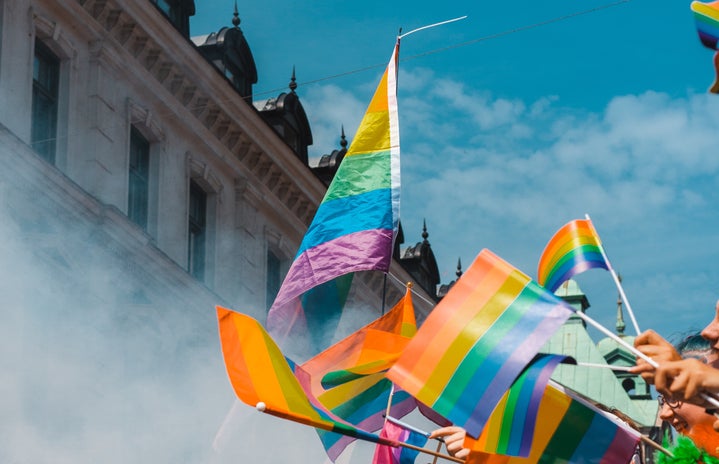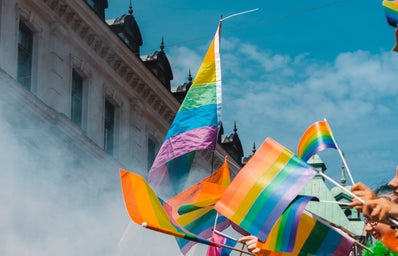“I feel like the only difference between platonic and romantic relationships would be, uh,” I gestured my hands around in circles, “the level of intimacy.”
I’m 13 years old, sitting in a circle with my Girls on the Run coach and other teammates. That week, we got to discuss navigating romantic relationships. I recall being excited about this lesson, hoping to gain valuable insight on the subject—perhaps some advice for the future. Still, when distinguishing romance confronted me, I hit a wall. I wasn’t expected to know the precise word for the concept, yet my coach grimaced and my face still grew hot with embarrassment.
She offered a smile, yet it quivered on her face. “I think what you’re referring to is sexual intimacy.”
A few other girls snickered with each other. Whether it was because my coach said the word ‘sexual’ or the fact that my statement added nothing substantial to the conversation, shame started crawling up my insides. I hugged my knees closer to my chest, mentally kicking myself for saying something so stupid. To make myself feel better, I simply chalked it up to immaturity. My world was still largely shaped through the lenses of video games. So, I figured that romance was an emotion that I would unlock later in life, like a new weapon or tool. It would be another achievement under my belt while progressing through life.
Three years later, a friend asked me to prom. We were in the theater program together and had gotten closer through the shows we’d done. According to my other friends, this was a natural progression; a textbook “friends-to-lovers” scenario playing out in front of their eyes. I’d been captivated by these same love stories since I was little but couldn’t exude the same confidence over this blooming relationship. New expectations came with this label, and heavy pressure landed on my chest. The way my stomach flipped was too intense to be called butterflies; it was anxiety. Like my middle school years, I thought I needed more time for my platonic feelings to develop further like they claimed theirs did. After an awkward kiss on the dance floor, my feelings toward them still didn’t change. Once they graduated, they asked me if I could see us pursuing more. There, my already flimsy resolve snapped. I said I wasn’t ready for a relationship, and everything ended there. I’d never felt more relieved in my life.
Then I knew something was wrong.
I have identified with the LGBTQ+ community since I was 12. Like most aspects of growing up, I cycled through different romantic orientations based on how I perceived romantic feelings. I was familiar with the asexual spectrum, but never seriously considered how it could apply to me until I arrived at university. In retrospect, I realized that I have never been able to distinguish between platonic and romantic feelings. When people said your partner should be your best friend, I understood that literally. If I admired someone who seemed cool and wanted to get closer to them, I would deem it as a crush. I would fantasize about typical “dating” things, like holding hands or cuddling. If I managed to get closer to them, those thoughts would vanish. I realized that I liked the idea of a romantic relationship, but the reality of one always repulsed me. Finally, I landed on the label, ‘aromantic’, to describe how I feel about romance—which is that I don’t experience those feelings.
It was a devastating epiphany because I believed I had failed my inner child’s dreams of falling in love. I crushed those hopes underneath my shoes but refused to let the ashes free. Why hold onto something you know will never happen? Why would I thrust myself into a situation that I know will make me unhappy? Honestly, I felt that I had to. Our society pushes that romance is the pinnacle of love, and one should always actively search for a partner to settle down with. Growing up, I learned that romance is the key to true happiness. Not experiencing it is considered a moral or character failure.
A common mindset rebuttal against aromanticism is that “Love makes us human”. I completely disagree with this take because love isn’t exclusive to humans. Our pets bond with us and love us to death. Several animal species mate for life; some even grieve for their loved ones if they pass, just like humans do. This isn’t what people usually mean when they’re talking about love. They automatically place romance at the peak of love, deeming all other forms of love inferior in the process. This is precisely why I hate this mindset. Aromantic people aren’t cold robots because they don’t experience romantic love. Whether it’s platonic or familial, I cherish all forms of love a person can experience.
While it can sometimes feel isolating, not desiring any romantic validation has ultimately become the most liberating feeling. While I can’t change the way society prioritizes romantic love above all else, I have never felt more confident or self-assured in my life. I am aromantic, and I’m not only content with how I feel, but I wear the badge with pride.


